‘There were P4s in my wee sister’s school vaping,” says one St Paul’s Academy pupil.
That’s children as young as seven or eight years old.
St Paul’s Academy – like schools across the country – sees some of its youngest pupils already using e-cigarettes when they arrive from primary school.
Head teacher Kirsty Small says local primary schools report evidence of vaping, such as discarded wrappers.
So the secondary school is spreading the word on the risks of vaping – among parents as well as pupils.
Kirsty says parents are often unaware that their child is vaping.
And some of those that are condoning it, seeing it as a safer alternative to smoking.
She said: “Some parents are very open, honest and almost distressed and say ‘we know they vape but we’d rather they did that than smoke’.
“That’s where we have to educate them and say ‘you can’t be part of that cycle’.”
The long term impact of vaping is yet to be established.
However, recent research found changes to DNA similar to those in smokers who develop cancer.
Children’s doctors say it can damage user’s lungs, hearts and brains.
E-cigarettes contain chemicals including nicotine which is more addictive for young people.
1 in 10 S4 pupils regularly vape
One in 10 S4 pupils admitted to regular e-cigarette use in a Scottish health and wellbeing census in 2021 and 2022.
The St Paul’s pupil said young people vape in school toilets.
“You go the bathroom after them and open the door and a big cloud of smoke comes out,” he said.
“It’s like they [the manufacturers] try to appeal to kids because it’s all flavours kids like.”
A fellow pupil told us she sees peers vaping “all the time”.
She said: “If someone wants to do it that’s their choice, no one can stop them, but it’s not good for their lungs and can cause breathing problems.”
A ban on the sale of single-use vapes is expected to come into force in Scotland on April 1, 2025.
But she reckons this is unlikely to deter young people.
“You can still buy them off [an online retailer] or you could buy the bigger rechargeable ones.”
Pupils leaving class to vape
Addicted pupils are leaving class to vape claiming to need the toilet, says Kirsty.
Staff are vigilant to this and report prolonged absences, she says.
But they also have to consider pupils’ dignity in granting bathroom requests.
And pupils show withdrawal symptoms, she says, including irritability and poor concentration.
“We do see young people becoming far more irritable, with each other as well with staff.
“Parents are reporting that too.”
Vapes flavours appeal to children, including watermelon, blueberry and even bubblegum, and they come in attractive colours and designs.
Dundee City Council education support officer Sarah Anderson said: “They appear to be directed at children with the fruit flavours, the bright colours. And they are accessible despite the law.
“That’s the concern as well, the age of first time experience and that seems to be lower with vaping [than smoking].
“We wouldn’t have seen primary school children smoking cigarettes. Maybe in rare cases if they had found one at home, but not in the same way.
“We know through studies that the younger you are when you try whatever substance it might be the more likely you are to become addicted later on.”
Under-18s buying in shops and online
Children buy disposable vapes online or in shops and share them, says Kirsty.
That communal aspect is further fuelling the problem.
“Most young people say they tried [a vape] because a friend had given it to them. Then they continue because they are addicted.”
Vapes are also cheaper, easier to use and easier to conceal than smelly cigarettes.
Some could easily be mistaken for a mascara bottle or a highlighter pen.
Sarah is worried about the lack of awareness about vaping and its risks.
She added: “Everything is still so muddy around the messaging about vaping because it was originally seen as part of smoking cessation.”
A 2015 UK government review concluded vapes were 95% less harmful than cigarettes.
Dundee schools vaping leaflet
To help inform young people and parents, pupils from St Paul’s Academy worked with NHS Tayside, Planet Youth and Dundee City Council to produce a leaflet.
Kirsty said this was a good start in getting the message across.
But she added: “There’s still a big piece of work to be done to educate parents and carers.”
It’s the yet unknown long-term impact and potential to lead to other substances that worry her most.
“We are going to have to wait maybe 20 years to see what the overall impact is on young people’s development and lungs.
‘We need parents’ help’
“It’s also the addiction. It’s one form of addiction that leads to another addiction that leads to a more serious addiction.”
A ban on disposable vapes will make some difference but not a lot, she reckons.
“While that law is very appealing, people can buy things online and I think that needs to be monitored as well.”
She is encouraged that other coming smoking and vaping legislation is UK-wide. This includes new powers to restrict vape flavours, packaging and display in shops.
But she says more action is needed now locally.
This includes people being more aware of the risks and reporting traders illegally selling e-cigarettes to under-18s.
She said: “We need help from parents and the community to tackle this.”
More information on vaping and young people is available here.
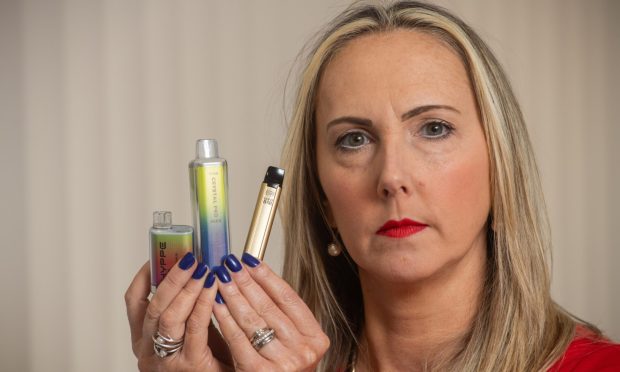
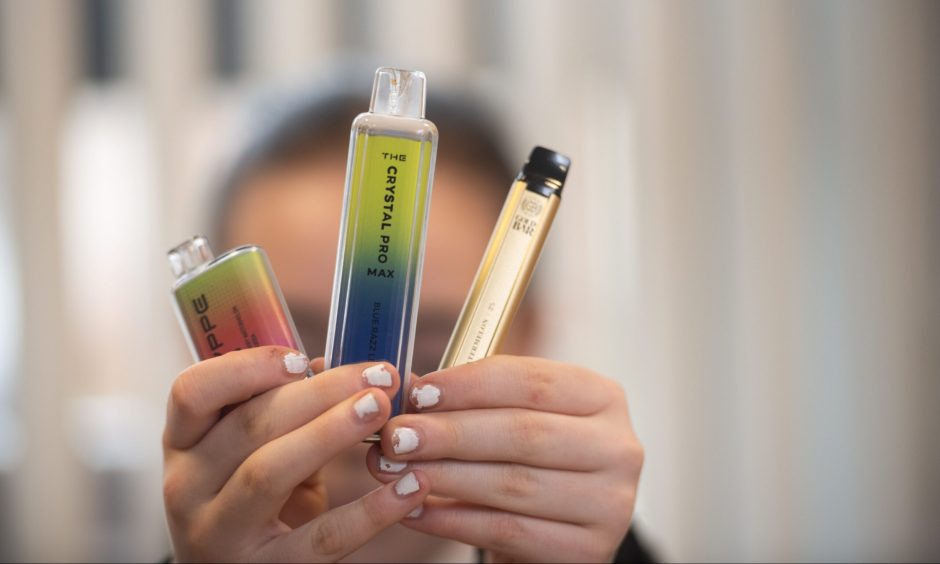
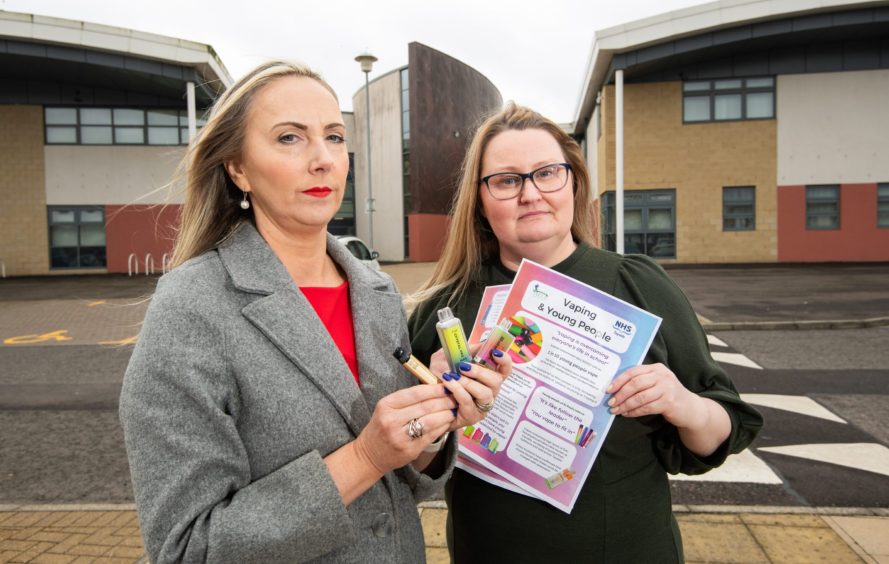
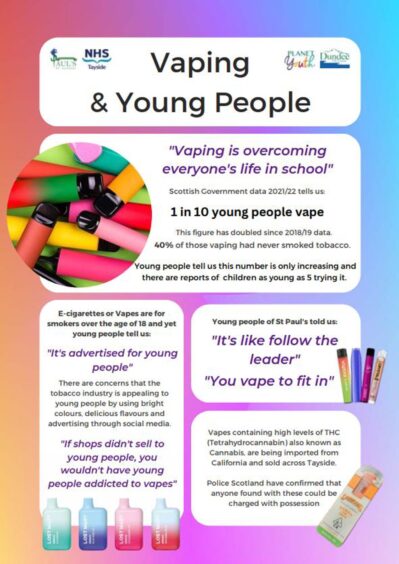


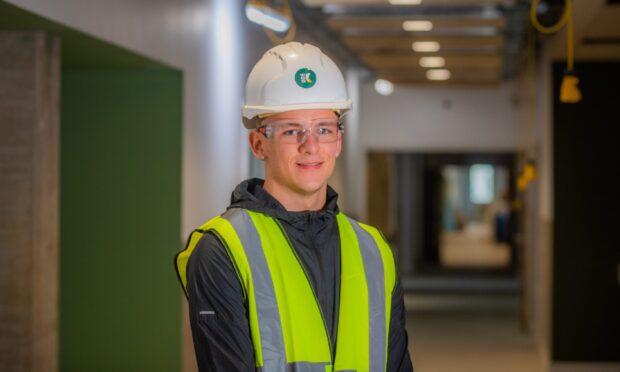







Conversation